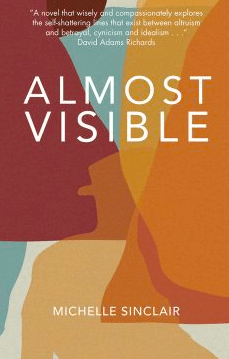Michelle Sinclair’s Almost Visible is a novel that aims to tie seemingly disparate narratives together. A young woman’s existential crisis is positioned alongside a radical political movement, survived by a Latin-American elderly man in need of housing care. If this feels, well, random, it’s because it is. The dissonance reads as an obvious attempt to use fiction as a method of uniting the human spirit. It reads, at first, as the setup of a joke: What do a millennial white woman and Latin-American elder have in common? The answer, however, isn’t exactly funny.
Readers are first introduced to Tess, a young woman seeking to revive her life’s pulse, in the midst of grieving the recent loss of her mother. She leaves behind a small town, her family, and a lover with whom many rights turned into many wrongs. Hers is a world of mysterious moralities: how to rationalize loss, or rationalize love for a man committed to another. Like many of my millennial peers, Tess abandons the insular world of her home, and figures she might be able to answer these questions in the romantic, boisterous, and provocative streets of Montreal. She arrives at the house of an old friend, Jana, where she will stay as a new roommate.

Almost Visible
Michelle Sinclair
Baraka Books
$24.99
paper
232pp
9781771862943
This theme is confronted in full force when Tess encounters Mr. Hector through her job. He reads like a cliché of a senior citizen: grumbling, “difficult,” and a homebody. Upon first meeting Tess, Mr. Hector utters wise idioms and drawn-out philosophies on what anything really means. He tells her, ““What makes reading resemble lovemaking is that within both of them times and spaces open.” After Tess comes across an old diary in Mr. Hector’s home, this disintegration of time and space begins.
Readers become privy to the musings of a young man, Andrés, and his life in an “unnamed country in South America” in the 1970s. Unnamed, I choose to believe, in order to speak to a larger message that supersedes one specific political movement over another. For Sinclair, it doesn’t matter who Andrés fought, but that he was part of a fight at all. He is utterly in love with a woman named Bárbara. While the love is reciprocated, Bárbara is driven by a passion for radical politics. Loving Barbara means André must cosign onto this passion. Bárbara beguiles him into a secret society of radicals, embroiling readers into a cast of vibrant characters external to Tess’ insular world. Every time Tess closes the diary, readers are returned to her grief, and her fumbling attempt at navigating her life in Montreal.
Over time, of course, Tess’ white guilt hits: what of her problems, comparative to Andres’? For all the existential crises Tess finds herself facing, death was never one. It was a fact of life. Her mother was gone, and life was continuing on. For Andrés, however, death was the risk worth facing: for the love of a woman, for the love of radical politics, or really, for the love of a woman who herself was in love with radical politics. One can see the needs of the author clearly in this haphazard comparison, and while there is much to consider about what draws these differing characters together, readers may see it as a thread stretched far too thin. Yes, we are all different, and yes, we are all the same. But Sinclair’s bold attempt at sneaking in an entirely different novel, within what otherwise would be a novella, doesn’t quite land in its ambition.
Secrets encompass the rest of the novel; plot twists abound. They are revealed in a flurry of short chapters near the end of the text. What’s behind Jana’s surface? What about Tess’ deceased mother? Who will come knocking on Tess’ door next? And, in thinking about narration, are the diaries she’s reading from a reliable narrator? Are any of us reliable narrators when it comes to the stories of our lives? These are the questions Almost Visible grapples with, and while a worthy rumination, one wonders if the knot at the centre of fiction holds tight enough. mRb






0 Comments